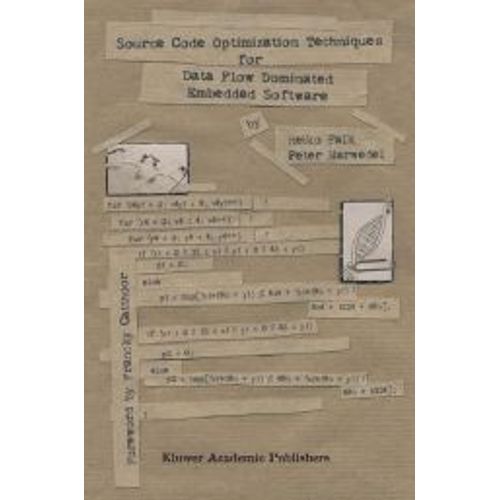

Source Code Optimization Techniques for Data Flow Dominated Embedded Software - H. Falk
- Format: Relié
- 226 pages Voir le descriptif
Vous en avez un à vendre ?
Vendez-le-vôtre182,99 €
Produit Neuf
Ou 45,75 € /mois
- Livraison : 25,00 €
- Livré entre le 8 et le 13 août
Nos autres offres
-
185,68 €
Occasion · Comme Neuf
Ou 46,42 € /mois
- Livraison : 25,00 €
- Protection acheteurs :
- 0,00 €
Service client à l'écoute et une politique de retour sans tracas - Livraison des USA en 3 a 4 semaines (2 mois si circonstances exceptionnelles) - La plupart de nos titres sont en anglais, sauf indication contraire. N'hésitez pas à nous envoyer un e-... Voir plus
- Payez directement sur Rakuten (CB, PayPal, 4xCB...)
- Récupérez le produit directement chez le vendeur
- Rakuten vous rembourse en cas de problème
Gratuit et sans engagement
Félicitations !
Nous sommes heureux de vous compter parmi nos membres du Club Rakuten !
TROUVER UN MAGASIN
Retour

Avis sur Source Code Optimization Techniques For Data Flow Dominated Embedded Software de Heiko Falk Format Relié - Livres
0 avis sur Source Code Optimization Techniques For Data Flow Dominated Embedded Software de Heiko Falk Format Relié - Livres
Donnez votre avis et cumulez 5
Les avis publiés font l'objet d'un contrôle automatisé de Rakuten.
Présentation Source Code Optimization Techniques For Data Flow Dominated Embedded Software de Heiko Falk Format Relié
- LivresAuteur(s) : H. Falk - P. MarwedelEditeur : Springer UsLangue : AnglaisParution : 01/12/2004Nombre de pages : 226Expédition : 566Dimensions : 25.1 x 16.7 x 2.0 Résumé :This book...

Résumé :
This book focuses on source-to-source code transformations that remove addressing-related overhead present in most multimedia or signal processing application programs. This approach is complementary to existing compiler technology. What is particularly attractive about the transformation flow pre? sented here is that its behavior is nearly independent of the target processor platform and the underlying compiler. Hence, the different source code trans? formations developed here lead to impressive performance improvements on most existing processor architecture styles, ranging from RISCs like ARM7 or MIPS over Superscalars like Intel-Pentium, PowerPC, DEC-Alpha, Sun and HP, to VLIW DSPs like TI C6x and Philips TriMedia. The source code did not have to be modified between processors to obtain these results. Apart from the performance improvements, the estimated energy is also significantly reduced for a given application run. These results were not obtained for academic codes but for realistic and rep? resentative applications, all selected from the multimedia domain. That shows the industrial relevance and importance of this research. At the same time, the scientific novelty and quality of the contributions have lead to several excellent papers that have been published in internationally renowned conferences like e. g. DATE. This book is hence of interest for academic researchers, both because of the overall description of the methodology and related work context and for the detailed descriptions of the compilation techniques and algorithms.
Détails de conformité du produit
Personne responsable dans l'UE
